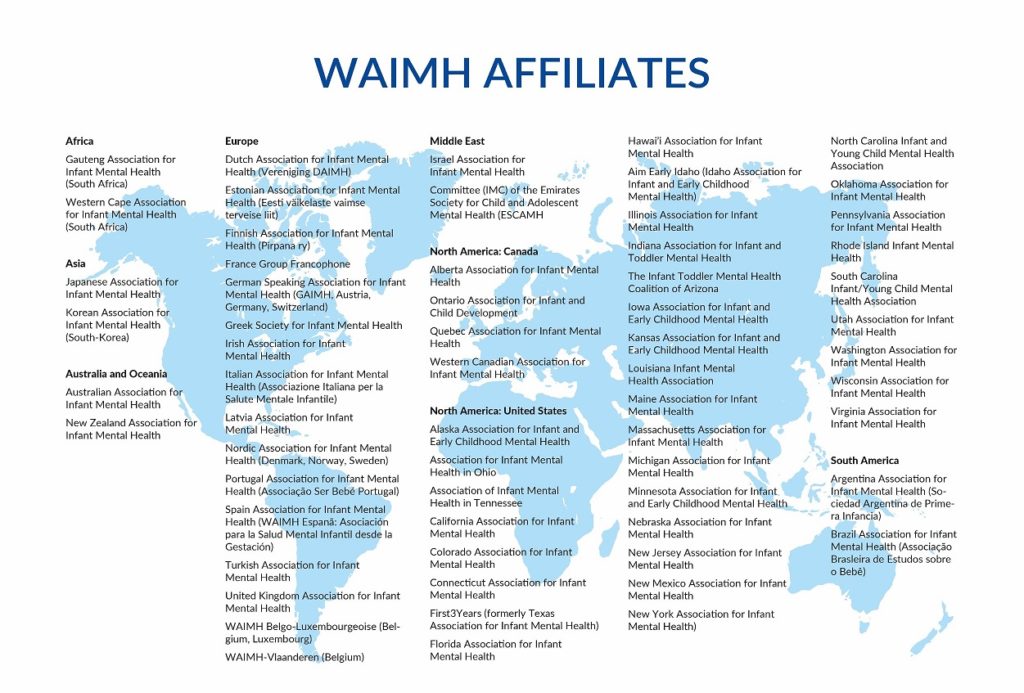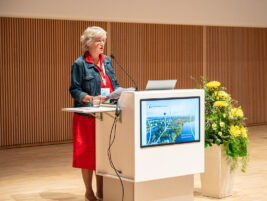The Affiliates Congress Institute at the 2021 WAIMH Congress in Brisbane was developed in response to feedback from a survey of Affiliates and aimed to explore the realities and challenges of running an infant mental health association, and the local solutions that have been developed. Drawing on six-member examples from around the world, a variety of models of running an infant mental health association were presented, in addition to ideas about how common challenges might be addressed, including through their connection with WAIMH. The aim of the Congress Institute was to enable participants to gain an understanding of context-specific as well as common needs, and how different organisations have responded to these needs.
The first session focused on Europe, the UK, Africa, and the Middle East, and presentations were made by Piret Visnapuu-Bernadt- Estonian AIMH; Nicole Canin – Sth Africa-Gauteng AIMH and Jane Barlow – AIMH UK. The second session focused on The Americas and included sessions from Sheryl Goldberg- Michigan AIMH; and Clara Schejtman-Argentinian AIMH. The final session comprised a discussion with co-chairs Anna Huber (WAIMH Affiliate Chair) and Jane Barlow (WAIMH Affiliate Representative) & two invited panelists – Nichole Paradis from the Alliance for Infant Mental Health, and Nicole Milburn from the Australian AIMH.
What we learned from this exercise was that the diversity of models in terms of how Affiliates were started and then maintained financially, largely reflected the local context and history. While some organisations were started by individuals with a vision who then engaged others in terms of rolling this vision out, other affiliates were developed more strategically using a range of in-person and online networking facilities. Similarly, in terms of resourcing the organization, some affiliates were able to draw on membership fees and other revenue resources in order to pay for a small number of employees, while others had no fees and were largely being run by volunteers.
A number of common themes emerged from the presentations. First, it was clear that while the commitment and work of volunteers was sufficient to initiate the organization and support ongoing work for a while, paid executive/admin roles became necessary once a certain level of expansion had been reached.
Second, while many affiliates derived their funding from membership fees and also from offering training opportunities, other activities were added as the organization progressed. For example, holding conferences for members and other interested participants has enabled networking as well as sharing of knowledge and research, practice and experiences.
Third, both advocacy and the provision of information were perceived to be important activities both for members but also for other stakeholders including the public, government and funders. Even smaller (e.g., Argentina) or more recently established organisations, (e.g., Gauteng) have focused on these kinds of lobbying and advocacy efforts to raise awareness and build an understanding of infant mental health needs of infants and their families. In contexts where resources are limited, such organizations have often used online forms of dissemination of important messages.
Fourth, a key focus for affiliates was the development of IMH specialized skills and understanding. For example, two of the Affiliates had developed IMH competency frameworks aimed at upskilling the IMH workforce. These also serve to inform stakeholders about specialized IMH skills and training that enable the provision of suitable services for infants and their families.
Fifth, as might be expected relationships and networks were perceived to be essential not only to building the affiliate but also to maintaining a vibrant organization. The issue of sustaining an organization beyond its initial establishment was seen as an ongoing challenge, especially when the energy and capacity of volunteers is the critical factor in the viability of some associations. Finally, the need to adapt to challenges was felt to be central to ensuring that each affiliate survived and continued to have relevance for their localities.
In the last session, Nichole Paradis presented some analysis into factors that contribute to how sustainable an IMH organization becomes. Specifically, a project[1] with conducted by Nonprofit Finance Fund (NFF) with 8 US Affiliates, 7 of whom are members of the Alliance for the Advancement of Infant Mental Health. The project identified the challenges of, “a system fueled heavily by volunteers and unfunded expenses—while serving a workforce unable to pay for the full cost of services.” The project confirmed a finding identified earlier in this paper, that there is great diversity in the business models employed by Affiliates. Important to note, that Affiliates with the greatest financial sustainability embrace that they are a business. Affiliates must be driven by their missions and must recognize the need to manage the revenue and expenses just like any other business. The Affiliates who participated in the project had all expanded beyond revenue from only membership and training/conferences. All offered an IMH credential or Endorsement. Most received funding in the form of grants and/or contracts for services delivered to IMH professionals.
Examples of strategies offered to Affiliates included:
- Be mindful that revenue diversification comes at a cost, i.e., learning new skills and protocols. NFF recommends, “It can often be helpful for organizations to focus on strengthening one or two revenue types (e.g., foundations, government, events) and investing in the capacity, expertise and skills necessary to diversify funding sources within a revenue type, before building out revenue across many different types.”
- Many Affiliates struggle with managing unfunded costs, “’Unfunded costs’ are those that are not currently incurred, but if covered, would allow the organization to work at its current level in a way that is reasonable and fair. ‘Sweat equity,’ or overworked and underpaid staff, is the most common example.” For Affiliates, NFF recommends that the true cost, i.e., what is needed to fully fund a proposed project, be included in a grant application or contract negotiations, whenever possible.
WAIMH now has over 60 affiliates spread across the globe. While this is impressive, there is a need to continue to develop new Affiliates particularly in parts of the Global South, where the importance of the first 1001 days (i.e. from conception to age 2) in terms of the long-term development of the child is not yet widely recognized and as such Infant Mental Health policy often does not exist. WAIMH recognizes that in some of the most populous parts of the world, e.g., Asia, and in parts of Africa, South America, and the Pacific there is a long way to go to grow understanding of IMH and to bring professionals together to support their important work in the Infant Mental Field.
While the process of establishing themselves as an Affiliate in terms of taking the first steps to begin the registration process can be difficult, moving from registration to a fully-fledged organization takes time and energy and a mentoring process in which more established affiliates in high-income countries work alongside a newly developing organization in the Global South would be one means of us supporting the development of new affiliates.
[1] This project was conducted with generous support from the Perigee Fund.
Authors
Jane Barlow,
WAIMH Affiliates Council Representative, UK
Anna Huber,
WAIMH Affiliates Council Chair, Australia
Nichole Paradis,
The Alliance for the Advancement of Infant Mental Health, USA








